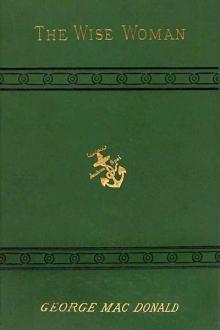The Wise Woman, George MacDonald [epub e ink reader TXT] 📗

- Author: George MacDonald
- Performer: -
Book online «The Wise Woman, George MacDonald [epub e ink reader TXT] 📗». Author George MacDonald
The Wise Woman
by George MacDonald
1875
CHAPTER I.
THERE was a certain country where things used to go rather oddly. For instance, you could never tell whether it was going to rain or hail, or whether or not the milk was going to turn sour. It was impossible to say whether the next baby would be a boy or a girl, or, even after he was a week old, whether he would wake sweet-tempered or cross.
In strict accordance with the peculiar nature of this country of uncertainties, it came to pass one day that, in the midst of a shower of rain that might well be called golden, seeing the sun, shining as it fell, turned all its drops into molten topazes, and every drop was good for a grain of golden corn, or a yellow cowslip, or a buttercup, or a dandelion at least,—while this splendid rain was falling, I say, with a musical patter upon the great leaves of the horse-chestnuts, which hung like Vandyke collars about the necks of the creamy, red-spotted blossoms, and on the leaves of the sycamores, looking as if they had blood in their veins, and on a multitude of flowers, of which some stood up and boldly held out their cups to catch their share, while others cowered down laughing under the soft patting blows of the heavy warm drops;—while this lovely rain was washing all the air clean from the motes, and the bad odours, and the poisonseeds that had escaped from their prisons during the long drought—while it fell, splashing, and sparkling, with a hum, and a rush, and a soft clashing—but stop—I am stealing, I find, and not that only, but with clumsy hands spoiling what I steal:—
“O Rain, with your dull two-fold sound,
The clash hard-by, and the murmur all round;”
—there! take it, Mr. Coleridge;—while, as I was saying, the lovely little rivers whose fountains are the clouds, and which cut their own channels through the air, and make sweet noises rubbing against their banks as they hurry down and down, until at length they are pulled up on a sudden, with a musical plash, in the very heart of an odorous flower, that first gasps and then sighs up a blissful scent, or on the bald head of a stone that never says thank you;—while the very sheep felt it blessing them, though it could never reach their skins through the depth of their long wool, and the veriest hedgehog—I mean the one with the longest spikes—came and spiked himself out to impale as many of the drops as he could,—while the rain was thus falling, and the leaves, and the flowers, and the sheep, and the cattle, and the hedgehog, were all busily receiving the golden rain, something happened. It was not a great battle, nor an earthquake, nor a coronation, but something more important than all those put together: a baby-girl was born—and her father was a king, and her mother was a queen, and her uncles and aunts were princes and princesses, and her first cousins were dukes and duchesses, and not one of her second cousins was less than a marquis or marchioness, or of her third cousins less than an earl or countess, and below a countess they did not care to count. So the little girl was Somebody; and yet for all that, strange to say, the first thing she did was to cry! told you it was a strange country.
As she grew up, everybody about her did his best to convince her that she was Somebody, and the girl herself was so easily persuaded of it that she quite forgot that anybody had ever told her so, and took it for a fundamental, innate, primary, firstborn, self-evident, necessary, and incontrovertible idea and principle that she was Somebody. And far be it from me to deny it! I will even go so far as to assert that in this odd country there was a huge number of Somebodies. Indeed, it was one of its oddities that every boy and girl in it was rather too ready to think he or she was Somebody; and the worst of it was that the princess never thought of there being more than one Somebody—and that was herself.
Far away to the north in the same country, on the side of a bleak hill, where a horse-chestnut or a sycamore was never seen, where were no meadows rich with buttercups, only steep, rough, breezy slopes, covered with dry prickly furze and its flowers of red gold, or moister, softer broom with its flowers of yellow gold, and great sweeps of purple heather, mixed with bilberries, and crowberries, and cranberries—no, I am all wrong—there was nothing out yet but a few furze blossoms, the rest were all waiting behind their doors till they were called;—and no full, slow-gliding river with meadow—sweet along its oozy banks, only a little brook here and there, that dashed past without a moment to say “How do you do?”—there—would you believe it?—while the same cloud that was dropping down golden rain all about the queen’s new baby, was dashing huge fierce handfuls of hail upon the hills, with such force that they flew spinning off the rocks and stones, went burrowing in the sheep’s wool, stung the cheeks and chin of the shepherd with their sharp, spiteful little blows, and made his dog wink and whine as they bounded off his hard wise head and long sagacious nose;—only, when they dropped plump down the chimney, and fell hissing in the little fire, they caught it then, for the clever little fire soon sent them up the chimney again, a good deal swollen, and harmless enough for a while!—there—what do you think?—among the hailstones, and the heather, and the cold mountain air, another little girl was born, whom the shepherd her father, and the shepherdess her mother, and a good many of her kindred too, thought Somebody. She had not an uncle or an aunt that was less than a shepherd or dairymaid, not a cousin that was less than a farm-labourer, not a second cousin that was less than a grocer, and they did not count farther. And yet, would you believe it? she too cried the very first thing. It was an odd country! And what is still more surprising, the shepherd and shepherdess and the dairymaids and the labourers were not a bit wiser than the king and the queen and the dukes and the marquises and the earls, for they too, one and all, so constantly taught the little woman that she was Somebody, that she also forgot that there were a great many more Somebodies besides herself in the world.
It was, indeed, a peculiar country—very different from ours—so different that my reader must not be too much surprised when I add the amazing fact, that most of its inhabitants, instead of enjoying the things they had, were always wanting the things they had not, often even the things it was least likely they ever could have. The grown men and women being like this, there is no reason to be further astonished that the Princess Rosamond—the name her parents gave her because it means Rose of the World—should grow up like them, wanting everything she could and everything she couldn’t have. The things she could have were a great many too many, for her foolish parents always gave her what they could; but still there remained a few things they couldn’t give her, for they were only a common king and queen. They could and did give her a lighted candle when she cried for it, and managed by much care that she should not burn her fingers or set her frock on fire; but when she cried for the moon, that they could not give her. They did the worst thing possible instead, however, for they pretended to do what they could not:—they got her a thin disc of brilliantly polished silver, as near the size of the moon as they could agree upon, and for a time she was delighted.
But, unfortunately, one evening she made the discovery that her moon was a little peculiar, inasmuch as she could not shine in the dark. Her nurse happened to snuff out the candles as she was playing with it, and instantly came a shriek of rage, for her moon had vanished. Presently, through the opening of the curtains, she caught sight of the real moon, far away in the sky, and shining quite calmly, as if she had been there all the time; and her rage increased to such a degree that if it had not passed off in a fit, I do not know what might have come of it.
As she grew up it was still the same—with this difference, that not only must she have everything, but she got tired of everything almost as soon as she had it. There was an accumulation of things in her nursery, and schoolroom, and bedroom that was perfectly appalling. Her mother’s wardrobes were almost useless to her, so packed were they with things of which she never took any notice. When she was five years old, they gave her a splendid gold repeater, so close set with diamonds and rubies that the back was just one crust of gems: in one of her little tempers as they called her hideously ugly rages, she dashed it against the back of the chimney, after which it never gave a single tick, and some of the diamonds went to the ash-pit. As she grew older still, she became fond of animals, not in a way that brought them much pleasure, or herself much satisfaction. When angry, she would beat them and try to pull them to pieces, and as soon as she became a little used to them, would neglect them altogether. Then, if they could, they would run away, and she was furious. Some white mice, which she had ceased feeding altogether, did so, and soon the palace was swarming with white mice. Their red eyes might be seen glowing, and their white skins gleaming, in every dark corner; but when it came to the king’s finding a nest of them in his second-best crown, he was angry, and ordered them to be drowned. The princess heard of it, however, and raised such a clamour that there they were left until they should run away of themselves, and the poor king had to wear his best crown every day till then. Nothing that was the princess’s property, whether she cared for it or not, was to be meddled with.
Of course as she grew, she grew worse, for she never tried to grow better. She became more and more peevish and fretful every day—dissatisfied not only with what she had, but with all that was around her, and constantly wishing things in general to be different. She found fault with everything and everybody and all that happened, and grew more and more disagreeable to everyone who had to do with her. At last, when she had nearly killed her nurse, and had all but succeeded in hanging herself, and was miserable from morning to night, her parents thought it time to do something.
A long way from the palace, in the heart of a deep wood of pine-trees, lived a wise woman. In some countries she would have been called a witch, but that would have been





Comments (0)